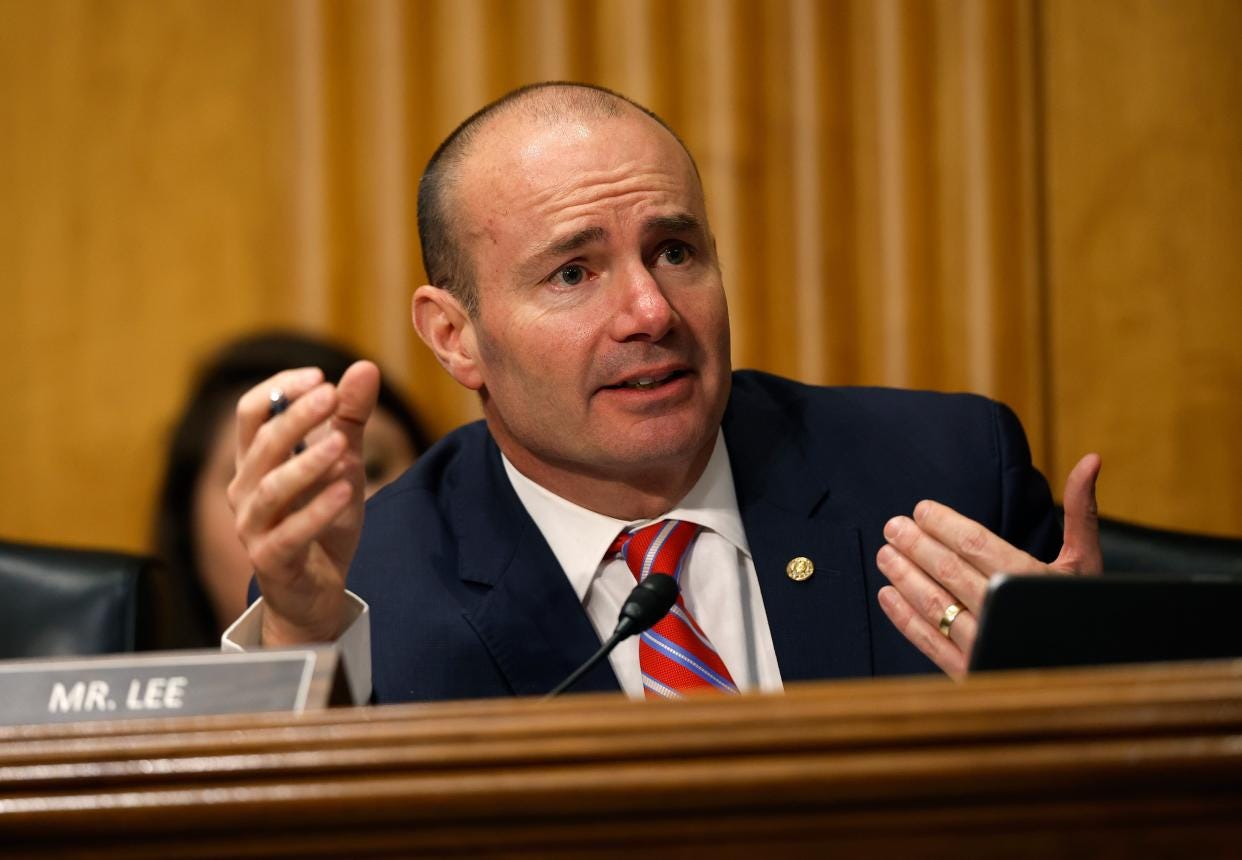Who Will Be Sidney Poitier in Congress?
“ A man dies when he refuses to stand up for that which is right. A man dies when he refuses to stand up for justice. A man dies when he refuses to take a stand for that which is true.” - Martin Luther King, Jr.
Sidney Poitier was an amazing actor, but even more an amazing human being. We are living in a time when the scariest part of it all is that people who seem to be humans with core values and ethics and morals have turned into monsters. I thought about using a less magnified word, but monsters is the word.
Mike Lee, who came out this past weekend after the heinous assassinations in Minnesota and actually tried to blame it on Minnesota Governor Tim Walz with a taunting social media post, used to be a wonderful human being. He was once considered a principled conservative, a constitutional scholar who clerked for Justice Samuel Alito, served as an Assistant U.S. Attorney, and won his Senate seat in 2010 as part of a wave of reform-minded conservatives. He advocated for limited government, co-sponsored bipartisan criminal justice reform through the FIRST STEP Act, and even took a rare stand at the 2016 Republican Convention to block Donald Trump’s nomination on constitutional grounds. These were not easy positions, but they were principled. That’s why this fall from grace is so hard to witness. This past week, people have sent poignant letters to him, saying, What happened to you? Where did you go? Even under the pressure of people asking him to withdraw his senseless and unfeeling attacks at a terrible time for Minnesota, he doubled down.
More and more, we’re seeing people become Americans without any empathy for other Americans and behave and speak in ways that would’ve been unthinkable not so long ago. And no one stands up and says enough. Not in a way that can be heard.
No one is willing to take the risk they used to, to stop train wrecks that are out of control. No one seems to be willing to stand in front of the train.
I was on the phone with somebody yesterday and we were talking about something totally outside of politics.
I was telling him the story of Sidney Poitier, who at the time, 1967, was a starving actor. He had had some success but no financial stability. He had a wife and child at home and no money. He was offered the film In the Heat of the Night. He had made a promise to himself to no longer play Black men who were either subservient, slaves, violent, criminals, or stupid.
For those who haven’t seen the film, and by the way, you should, there’s a scene in the middle where the Poitier character, who is a police office from the North, gets stuck in the South trying to solve a murder before he’s allowed to head back home. He is struck by the owner of a cotton plantation. The man slaps him across the face, and the script called for Mr. Poitier to simply walk away. He said he was very sorry, but he could not accept the role. He knew it was the role of a lifetime, but he said that no man with any dignity would accept that kind of behavior. He would’ve slapped him back, and if they wouldn’t allow him to do that, he would not play the role.
The director wanted him desperately and fought to change the script, and it was a real fight. He finally got the powers that be to agree to it, but Sidney wasn’t satisfied. He said that they also had to agree that when they showed the film in the South, they would not cut it. They would not cut the scene and they would not cut the slap back. Turns out that was exactly what they had planned to do.
As an aside, it reminds us that we - even in the sixties - were still cow-tailing to the southern racist point of view and making films palatable to them. And, now, we are doing it again, even more. They are taking back control of the country’s racism and making the north succumb.
They finally agreed to do it, and it was put in the contract. When the film came out, the scene was headlines around the world. The headline read The Slap Heard Around the World, and the United States was called out on its treatment of “colored people” historically for decades and centuries. It was a tipping point. It was the first time in history that a person of color stood up for himself on screen, and were not portrayed as either a victim or a thug. The world applauded. Not everyone in America did, however. And yet in a divided America back then, the film won Best Picture at the Academy Awards the next year. I taught the film in Maine last year, and I think it should be shown all over this country this summer.
What many don’t know is that Poitier also feared for his life. He knew that insisting on showing the scene uncut in the South could provoke real danger. He understood that some audiences would not take kindly to a Black man slapping a white man back on screen. And he was right. He received threats. He did it anyway. Because dignity was non-negotiable.
Poitier had to take a major risk to do it. His life was in danger. His family was hungry. He knew he may never work again. And, he could have been shot by a MAGA preview. He didn’t care, because he had a sense of value and a sense of right and wrong that made him say what he was going to have to do was not worth what he was going to get.
And, so I have very little sympathy for the senators who we hear are ‘afraid’ to stand up.
It is time to ask the other side of the aisle, Who among you will finally stand up and say that what you’re getting is not worth what you’re giving up? That what your children are seeing you become is not who you want to be remembered as?
Who among you will be a Sidney Poitier?
Will it be you, Lindsey Graham? Your best friend John McCain stayed at the Hanoi Hilton four years longer than he had to because he refused to leave other men behind. Because of his family’s stature, he could have left. Freedom and the end of his daily beatings and fear of death were not worth giving up his sense of duty and honor. Could you channel him just once and stand up and say, I won’t do this anymore?
Will it be you, Susan Collins? I know you know better. The people of Maine will thank you. Remember Senator Margaret Chase Smith, the first woman in the Senate and the first person in Congress to openly challenge McCarthy in her June 1, 1950 “Declaration of Conscience.” She stood alone in that chamber, denouncing the “forum of hate and character assassination” and urging respect for “the right to criticize… the right to hold unpopular beliefs… the right to protest; the right of independent thought.” Her courage didn’t just speak truth to power, it helped reshape America’s moral compass. Can you channel her now? Can you honor the commonality you have in the shared state that you represent? Will it be you?
How about you, Murkowski? Could it be you? I know you’re suffering. You look so much older than you did a year ago. I believe it could be you. I really do.
In my mind’s eye, having seen too many happy-ending movies, I hope it’s Mike Lee. Mike Lee, who actually called out Trump the first time around way back in 2016 and 2017, who said he was a thug, who will look back on this past weekend and say, I lost my mind. Where did I go? I hope it’s him.
His lack of remorse or any caring about the children of the couple that was killed after he made those comments is chilling. Or the Senator from Iowa who said everyone’s gonna die at some point, so what does she care if she kills some of them early, and then she doubled down. Not an inch of remorse.
I’m trying to figure out what’s happening to us. Is it because we’re looking at screens instead of into the eyes of other humans?
But in the meantime, I’m asking all of us to channel that amazing human Sidney Poitier, who certainly wanted to feel that he could feed his wife and child, but was unwilling to comfortably do it at the risk of giving up one inch of his values. And many of the people of color who came after him have thanked him on the stage and off.
The thing that has always made America different than other countries is our sense of right and wrong and our incredible empathy for others, and the generosity that has gone along with it. Yes, some of it is gone now, it’s true. But we can have it back, as long as we focus on remembering those who have shown us the way.




This needs a wider audience - may it be passed along many times
Love this post!